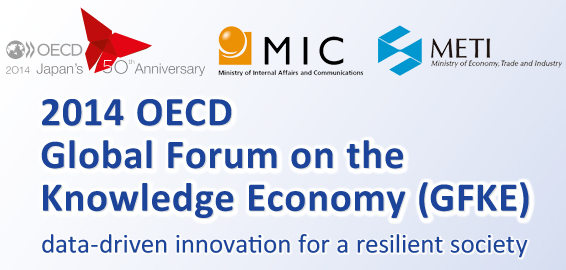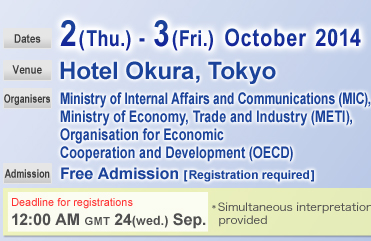|
Session 2
14:00-15:45
|
“Addressing complex societal challenges”
- The real-time analysis of a wide range of data generated through social media, mobile devices and physical sensors (e.g. Internet of Things) provides a new opportunity for addressing complex societal challenges, including, in particular, crisis prevention and disaster management. A series of documentary films, “Disaster Big Data”, produced by Japanese public broadcaster NHK, for example, has shown how data analytics can help better understand and respond to tremendous disasters such as the one caused by the 2011 earthquake and tsunami. Volunteers at Splunk, for example, crowd-sourced and analysed data from Twitter feeds to generate timelines of events and participatory maps during Hurricane Sandy (United States) to determine the areas most affected and in most need of supplies. London has used data analytics to ensure the reliability of its transportation system.
Many developing countries are also using data analytics for crisis prevention and disaster management. Thailand is monitoring natural disaster prone areas such as forests and rivers with satellite and ground sensors in order to better react in emergency situations. The Kenyan-based non-profit software company Ushahidi created a system to collect real-time data from eyewitnesses of violence in the aftermath of Kenya's disputed 2007 presidential election.
Addressing complex societal challenges through data-driven innovation (DDI), however, comes with a number of challenges. For example, a mutually shared vision of collaboration between all main stakeholder groups (including citizens, businesses and governments) is key to success. Furthermore, there is a serious risk that the underlying data and algorithms could lead to unexpected false results due to unknown biases, false reporting, or a rapidly changing environment, thus tampering decision-making. Google Flu Trends, for example, has been used by researchers and citizens since 2008 as a means to accurately estimate flu infection faster than the United States Centers for Disease Control and Prevention (CDC). However, in January 2013, Google Flu Trends drastically overestimated flu infection rates in the United States.
Panellists in this session will share their experience in realising the potential of DDI for addressing complex societal challenges with a focus on crisis prevention and disaster management.
The discussion will explore how best to use data analytics with a view to more broadly identifying challenges that could prevent DDI from establishing a more resilient economy and society.
Questions to be discussed may include:
- •
- What types of data and analytics can be used to improve risk management and disaster response, and to broadly establish a more resilient economy and society?
- •
- How can governments promote a secure and robust infrastructure through the use of data and analytics?
- •
- How well suited are current policy frameworks to enabling data-centric multi-stakeholder collaboration?
Moderator - Ms. Anne Carblanc
- Head of Division for Digital Economy Policy, DSTI, OECD
Presentation - Mr. Hirofumi Abe
- NHK
Panellists - Mr. Takeshi Imai
- Executive, Global Telematics Division, Honda Motor Co., Ltd.
PDF download - Dr. Alanna Simpson
- Sr. Disaster Risk Management Specialist, World Bank
PDF download - Mr. Henry Addo
- Ushahidi
PDF download - Mr. Jop Esmeijer
- TNO
PDF download
|
|
Session 3
16:05-17:35
|
“Leveraging data-driven innovation in aging societies”
- The share of the population over 65 years of age has been increasing in OECD and its Partner economies over the past few decades. In 2010, around 15% of the OECD population was over 65 years old. This ratio is expected to rise to 26% by 2050. Outside the OECD area, while less-developed regions still have young populations, some of the larger emerging economies are likely to converge with OECD population-aging profiles by mid-century. Aging will generate a range of serious challenges. Pension, health and long-term care spending is forecast to grow faster than national income in most OECD economies. Aging will also generate a range of serious challenges for productivity performance, as labour forces age in some countries and shrink in others.
In recent years, the policy debate has focused on how best to mitigate these pressures and the use of data and analytics is being considered as an opportunity to address special needs of aging societies. The growing range and volume of data collected today (behavioural, genetic, environmental, epigenetic, social, clinical, administrative data, etc.) promises to deliver solutions to complex, chronic health conditions and overcome physical, sensory, and cognitive impairments of the older populations- in particular to improve older persons' ability to stay independent and take charge of their health and wellness.
The development of large global databases and open science also provide a number of near-term and long-term opportunities for greater international cooperation towards accelerating new therapeutics discovery and development and the evaluation of new care models for Alzheimer's disease and dementia.
While these opportunities for addressing the needs of aging societies are acknowledged, data governance frameworks are still needed that provide incentives for data sharing between all stakeholder groups and that enable the interoperability of data-driven health and care-related services.
This session will shed light on the importance of data and analytics in aging society with a particular focus on new models of care and smart solutions to support independent living and research. Participants will highlight good practices in the use of big data to empower older people, and as an opportunity for social growth and innovation.
Questions to be discussed may include:
- •
- What are the opportunities for big data and analytics in addressing the needs of aging societies?
- •
- What frameworks are needed to maximize the benefits and minimize the risks?
- •
- What data governance and incentives need to be in place to promote data sharing and enable integrated assisted living and care solutions?
Moderator - Dr. Elettra Ronchi
- Senior Policy Analyst, Division for Digital Economy Policy, DSTI, OECD
Panellists - Prof. Toshio Obi
- Waseda University
PDF download - Mr. Satoshi Yamaguchi
- Deputy General Manager, NTT East
PDF download - Mr. Mohammad-Reza (Saied) Tazari
- Associate Head, Fraunhofer-Institut für Graphische Datenverarbeitung IGD
PDF download - Dr. David Glance
- Director, UWA Centre for Software Practice
PDF download
|











